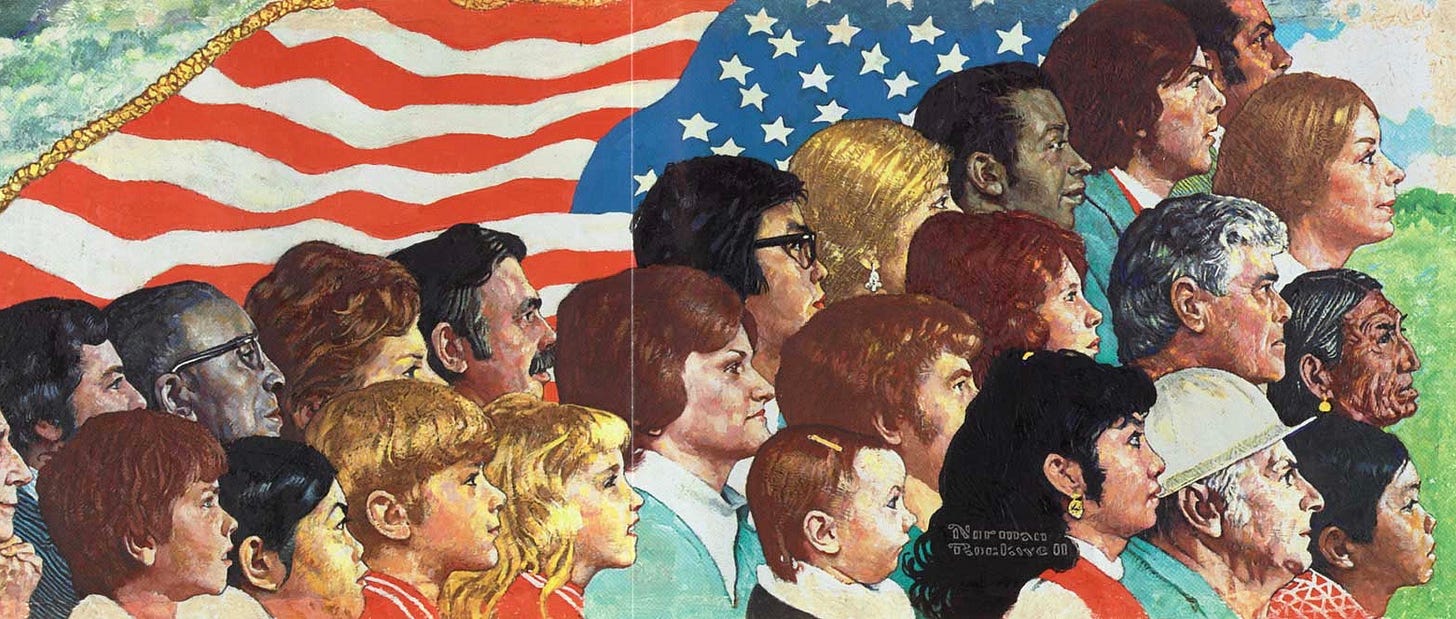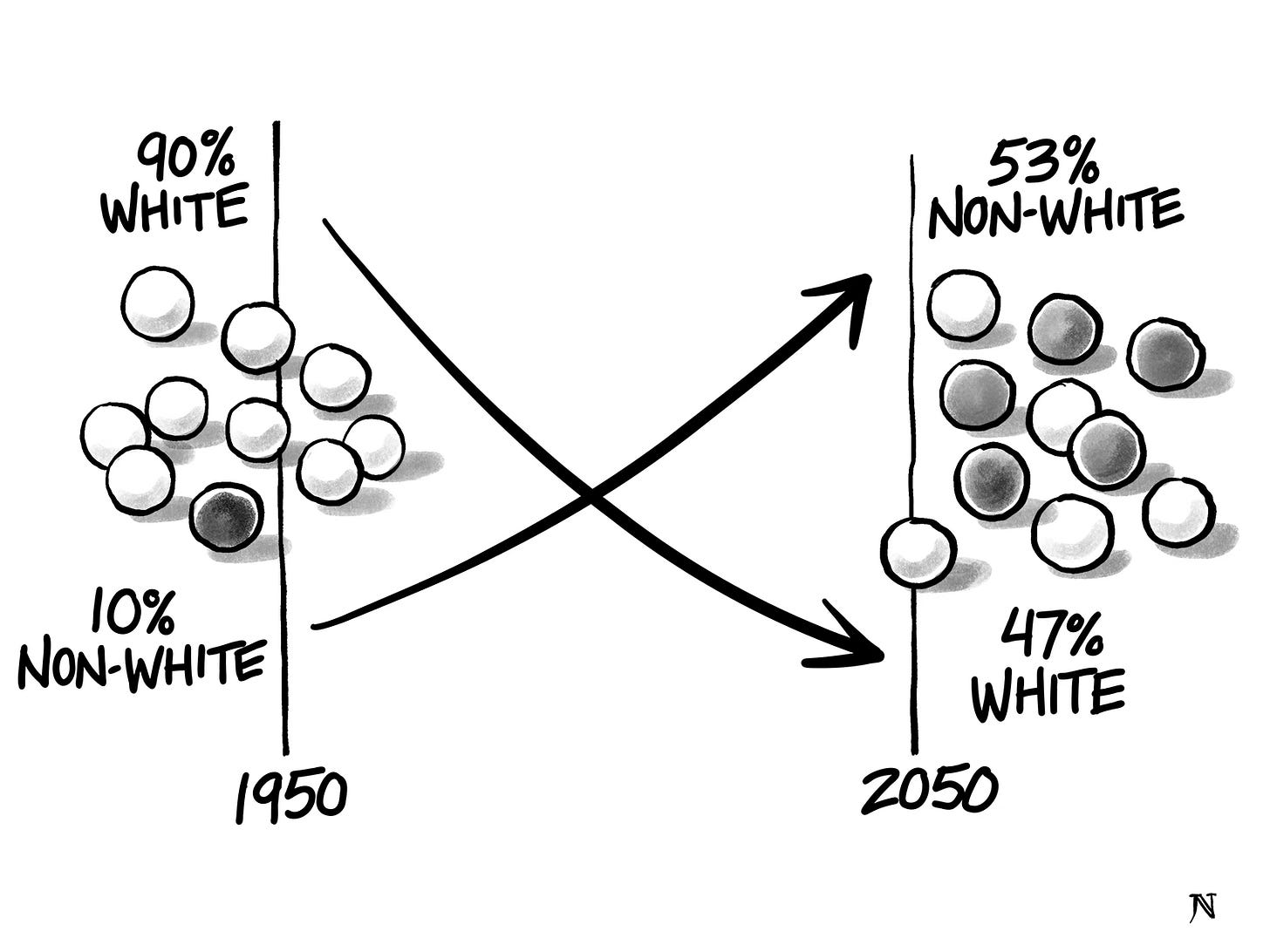Triangulating the race for POTUS
Three broad frames for how this unfolds
Biden did the smart thing and stepped aside. Like two Dems who did the same before him (Truman, Johnson), he will be treated very kindly by history. And yes, it will be most noteworthy than his stint in national office was bookended by the first African American male president and the first African/Indian American female president. His era will be viewed by historians as a great turning point from America’s present White Christian-defined nationalism to something bigger and better yet-to-be-named.
Understand: America was 80% White and overwhelmingly Christian in its first census (1790). That White share rose steadily over the 19th century and peaked at 90% in 1950. Since then and particularly after we reformed our immigration policies under Johnson, Whites have stealthily lost ground to non-Whites, who will achieve a collective majority status nationally around the year 2044, having already achieved it in the age range 0-25, in virtually every major metropolitan area, and in roughly one-fifth of US states.
Come mid-century, Whites in America will stand at just over 45% — essentially matching the share for the Western Hemisphere as a whole (45%).
On one level, this journey is amazing and unprecedented — and thus politically dangerous. In that broader, hemispheric framing, we are simply becoming like the rest of our neighborhood.
You may say that I fixate on this point, but the sheer fact that Trumpism and MAGA are White Christian Nationalism incarnate proves my point: people declare against what they fear — here, a non-White-centric, non-Christian-centric nationalism that, per all descriptions and expectations and historical experience will be supra-nationalist in spirit (i.e., looking to expand its presence, influences, leadership, and membership — essentially re-engaging the American Spirit along the lines of the EU’s ambitions these past years).
We live in an era of superpowers integrating our world, but we remain an outlier for now with our inward turn of the last 15 years. This is why we fear or disdain the other superpowers today: they have ambitions and drive and vision while we have divisions, fear, and bizarre myopia (What about the danger posed by transgenders!).
America will be a different beast on the far side of multiple revolutions going on right now in climate, demographics, global development/consumption, and its own racial makeover. It is an amazing time to be alive and be part of all this change and adaptation. We are speeding through history.
So, what are my three broad frames for this race?
First, from David Brooks of the NYT: the observation that Trumpism is zero-sum in its mindset while, in a reversal of historical roles, it is now the Dems who preach non-zero-sum opportunities.
Trumpism sees a world of limits, fixed sums, and fierce competition to get mine before you get yours. It is an angry, defensive crouch. It is also tribal and thus friendless — by design, as one sells out allies for anything one can get. In MAGA-land, we survive by hoarding, building walls, and denying them. All we have to do to achieve this sense of narrow safety is to entrust all our politics to one man.
And yes, that is Weimar Germany 1933. We face very similar dangers here today.
The Dems right now see something better, more optimistic, and addressable. There are “revolutions” to be pursued, particularly with regard to the environment and energy, and there are expansive definitions of what it means to be American (the many and varied paths to happiness). Within the Dems right now, we lack that sense that there is only so much wealth and power out there to be had. As such, we have far more faith in the future and can thus offer up — with pride and confidence — a ticket headed by an African/Indian American woman, the very image of our blended, globally connected future.
That is frame #1: zero-sum thinking versus non-zero-sum thinking.
Frame #2 comes from my old schoolmate Fareed Zakaria: With the historical move, across my lifetime, from strong parties to strong partisanship, reflected in the power of primaries over party leadership/consensus when it comes to fielding candidates, America has let extremism take over its two-party system. There remains a vast, moderate, tolerant, flexible, adaptive political middle in America. I know, I live there, even if it’s mostly in our heads right now.
But partisan activism has twisted all that, leaving us fighting over tiny slices of reality featuring cultural scapegoats (like transgenders) when we should be dealing with all these world-reshaping, history-bending developments out there — and in here.
Fareed’s point: Europe’s parliamentary system features strong parties who, by dint of their authority in selecting leadership — essentially post-election — can sell a vision to voters, get public buy-in, and then install the most appropriate leadership for the moment. It’s a policy contest, not a popularity contest.
Our two-party system is now being decided by a tiny fraction of voters in a few early primaries, and that is, on average, not producing good leadership but rather ideologues and performative politicians (Gaetz and MTG being the apogee — although Trump himself remains the Master) who are taking us nowhere but down.
Which gets me to frame #3: The rise of White Christian Nationalism has a very Marxian feel — not primarily in terms of content (although there are some truly odd overlaps) but in that sort of emergent, viral class consciousness (here, decidedly tinted by race and religion in a very tight package).
When Obama was elected in 2008, White America woke up in a new era, and, for a large chunk of that America, that pathway struck them as scary and disorienting and ultimately non-American (not our “civilization,” not our “way of life,” not “the America I grew up in,” not “the America I recognize,” “why do I have to serve those people,” etc.).
On this basis, Obama’s two terms engendered a counter-response, one first grounded in middle class angst (legit and good to address) but which became twisted into something larger and more exclusive (White Christian Nationalism) out of great existential fears (They are taking over. They are coming for you.).
Trumpism and MAGA and White Christian Nationalism (WCN) are all legitimately viral and grass-roots in their dynamics — very much in line with Marx’s concept of spontaneous class consciousness.
But guess what?
The Dems have their own variant: less coherent but just as excitable and motivating. Again, I don’t yet have a name for whatever we Dems are selling right now, but it’s clearly a rejection of the zero-sum, extreme partisanship, Manichaean world view of good-v-evil.
All politics begins with the question: are humanity’s paths to happiness varied or singular?
If varied, you believe in democracy.
If singular, you submit to those strong leaders who have cracked that code and are willing to enforce it at all costs.
The Dems still believe in democracy; the GOP right now does not.
That is what made yesterday so amazing and exciting to me: just like in 2020, when the Dems stunningly swarmed to support Biden after his primary win in South Carolina indicated both the voters’ desire and Joe’s ability to leverage it, yesterday we saw a very similar groundswell of support for Harris.
In short, the Dems are getting their own form of class consciousness, and it is powerful.
Where it takes us is still up for debate, but what it offers us in vision is clear: not a retreat into theocracy (our Catholic sharia SCOTUS), not a retreat into intolerant and economically-backward nationalism (Trumpism), and not a desperate bid to re-establish White privilege, dominance, and centrality (MAGA, WCN).
The GOP rejects the world America built because of what it has done to alter us back here at home.
[Point stipulated: America forever and profoundly changed the world by spreading its gospel of economic interdependency in the form of “globalization.” Now, that world challenges and changes us in equally profound ways.]
The Dems do not reject this larger world as it presents itself today (and yes, that is a change back to something more Clintonian), and thus are ready, willing, and able to address that complex world in all its challenges. The GOP is not.
I choose the Dems because I choose the future, I choose optimism, I choose hope, and I choose solutions that work for all.












"I choose the Dems because I choose the future, I choose optimism, I choose hope, and I choose solutions that work for all." Great slogan, much easier to say than execute, of course. Dems policy falls short of the aspiration far too often but at least the aspirations are directed in the proper direction.
Spot on! I liked your rear view mirror analogy in 'America's New Map'. MAGA's looking backward. Like you, I prefer to look ahead. And you can't fight the demographic shift of the population. Well, I guess you can fight and finagle to maintain the duopoly, gerrymander, put up voting restrictions, etc.